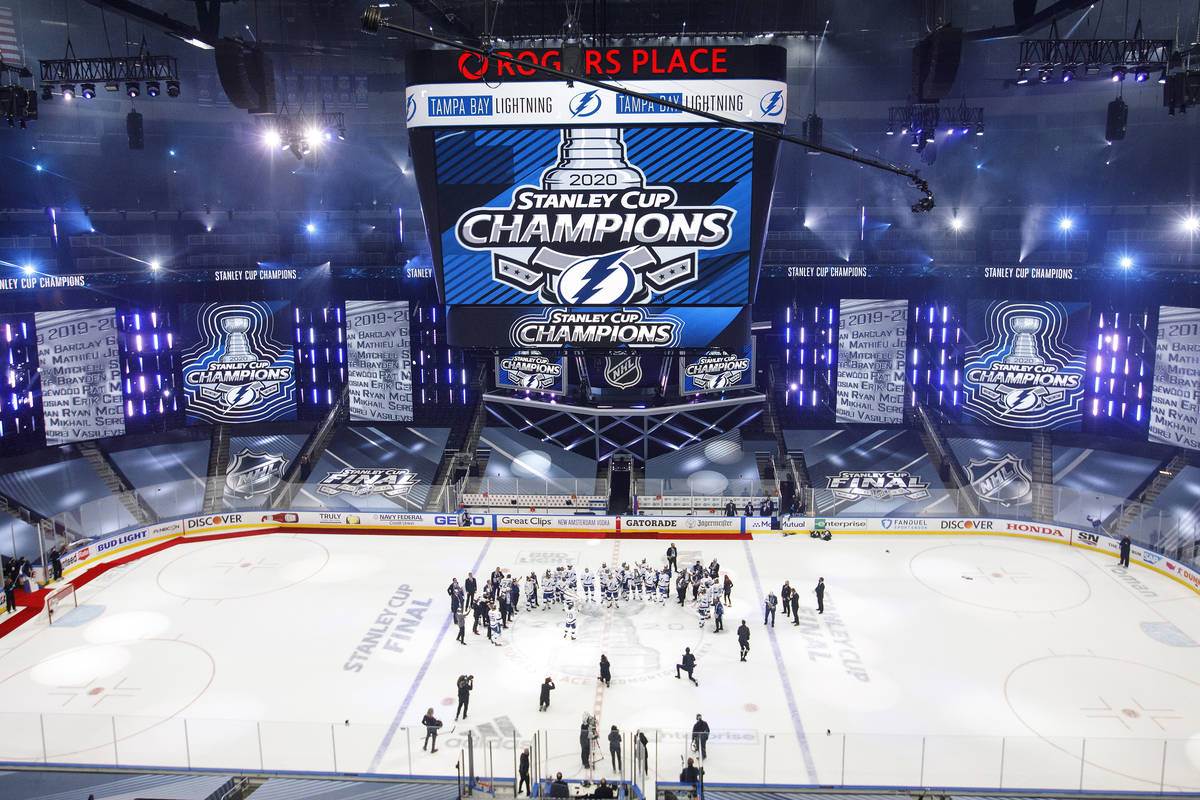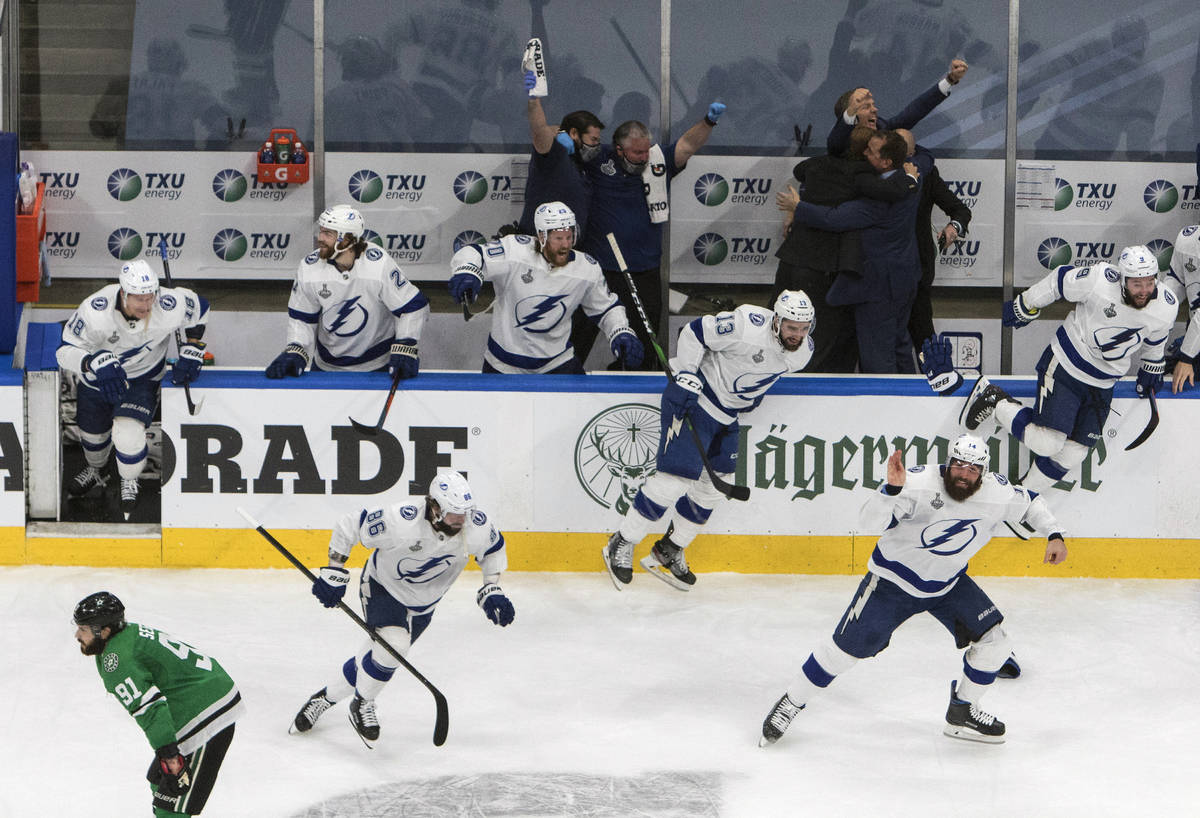NHL faces obstacles before making decision on 2020-21 season
The 2019-20 NHL season ended almost 12 months after it started with the Tampa Bay Lightning lifting the Stanley Cup on Monday in Edmonton, Alberta.
No one knows when the next one will begin.
The NHL has tentative dates for the start of training camps (Nov. 17) and the beginning of the 2020-21 season (Dec. 1). But few people in hockey think those dates are realistic.
“If I was a betting man, I’d say we’re going to start later than projected,” Golden Knights center Paul Stastny said.
It leaves far more questions than answers after the league and players worked so hard to stage a postseason in two Canadian bubbles. Numerous decisions need to be made before pucks are dropped again.
“Anything that anybody suggests or reads or writes or commentates about next season is nothing more than speculation,” commissioner Gary Bettman said Sept. 19. “Dec. 1 has always been a notional date. I will not be surprised if it slips into later December. It could slip into January.”
The NHL still is dealing with many of the same issues that caused it to retreat to secure zones in Toronto and Edmonton.
The COVID-19 pandemic is still a threat. Travel is still difficult. The ability to have fans is still in doubt. Those problems don’t seem to be going away anytime soon, either.
That’s why it makes sense for the NHL to potentially delay its season further and buy more time to make better informed decisions. Bettman compared it to the league’s diligent process when it came to selecting Toronto and Edmonton as its hub cities.
The NHL can’t wait forever, though. A typical season starts in October and ends in June. Its calendar is now way out of whack.
“My preference would be to stay out of summer as much as possible,” said Bettman, who added that he still wants a full 82-game regular season.
Still, even pushing back its start a little will give the league more time to determine what next season will look like. Will it stage games in home arenas, like the NFL and Major League Baseball have done? Or will it need to return to bubbles to ensure everyone’s health and safety?
The latter option is likely a final resort. Asking players to leave their families and friends and spend little time outside to chase a Cup is one thing. It will be a lot harder to convince the NHL Players’ Association to do it for regular-season games.
“I hope that doesn’t happen again,” Knights left wing Max Pacioretty said. “It was great to spend time with my teammates and to get an opportunity to play for the ultimate prize. But I just hope the world takes a turn for the better here and we’re able to hopefully get some normalcy back.”
Playing in home arenas has its own challenges. First of all, how will the league handle travel? The NFL plays once a week, so travel wasn’t a major issue. MLB played a 60-game regular season and limited teams to a regional schedule. That could work for even part of a hockey season, but then the Canadian border comes into play.
Restrictions on nonessential travel there meant the Toronto Blue Jays were forced to play in Buffalo, New York. It’s a much larger problem for the NHL, which has seven Canadian teams.
Even if the league can come up with a schedule, will fans be allowed? If so, how many?
The door opened for the Knights to have fans Tuesday when Gov. Steve Sisolak said facilities with capacity limits greater than 2,500 will be allowed to host 10 percent of their total capacity. That means T-Mobile Arena could potentially host about 1,800 fans.
Several NFL teams are allowing socially distant crowds. But the NHL hasn’t committed to anything.
“We’re going to do whatever is safe,” deputy commissioner Bill Daly said. “Obviously, we’re all watching with interest with respect to what’s going on in European hockey leagues and their policies in relation to fans, and the National Football League and what’s going on in collegiate athletics. Those are all valuable data points that we’ll have to consider when it comes time to start making decisions.”
Even having limited crowds would be huge for the NHL. Bettman estimated at least 50 percent of the league’s revenue comes directly or indirectly (parking, concessions, merchandise) from attendance. He insisted the NHL was in fine financial shape despite the pandemic, but even a few extra bucks wouldn’t hurt.
Bettman also said it’s possible the league starts with no fans, moves to limited crowds and possibly has full buildings by the end of the season.
“How we start doesn’t necessarily relate to how we’re going to finish,” he said.
No matter what, it’s going to be one of the strangest regular seasons in league history after one of the most bizarre postseasons in league history. The NHL, despite numerous obstacles, found a way to award a Stanley Cup. Now the process begins to figure out how to do that in 2021.
“That’s a question for everybody,” Stastny said. “Who knows? Who knows how much changes in a week or two weeks or three weeks?”
Contact Ben Gotz at bgotz@reviewjournal.com. Follow @BenSGotz on Twitter.















